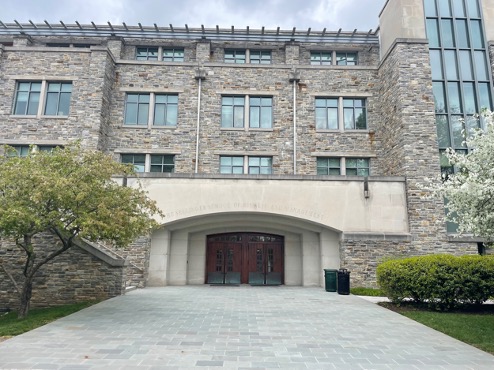Human beings have been telling stories since the beginning, however the way they tell and share those stories changes often as a result of new and improved technology. Students and faculty gathered around a conference room over lunch to listen to Dr. Karsonya “Kaye” Whitehead of the communication and African and African American Studies (AAAS) departments speak about storytelling through social media, a booming platform resulting from 21st century technology.
After being introduced by Brian Norman, the director of the AAAS, Dr. Whitehead encouraged everyone in the room to take out their phones and live-tweet the talk using the hashtag “#quiltednarratives,” which was the title of the talk.
A quilted narrative, according to Dr. Whitehead, is the combining of stories to form an account of connected events. Stories, she said, are essential to mankind, and create a special relationship between the teller and the listener. Stories play a role in each individual’s personal development based on familial, social and cultural influences.
“I shaped my own narrative based on what I heard,” said Dr. Whitehead after sharing an anecdote about the stories her mother told her during her childhood. “…We all have a story in us.”
However, Dr. Whitehead went on to explain that the development of technology has greatly affected the way people share their stories. First there was the printing press, then movies, television, computers and finally social media, which Dr. Whitehead believes changed everything.
“It is one of those fundamental moments…that was a shift in our culture,” she said. “What is Facebook but a place to put your story out there?”
And people are reading those stories as well. Social media allows people to connect with others they ordinarily would not, and follow people they have never met. According to Dr. Whitehead, Facebook has one billion users, Twitter has 500 million users, Google+ has 400 million users and the Internet as a whole has 2.4 billion users. The opportunities for sharing one’s story in the 21st century are unmatched by any other time in history.
“People are following other people…people are trolling,” said Dr. Whitehead. “There’s something to be said about no longer writing your story.”
Dr. Whitehead encouraged students and faculty to be vulnerable and post about their passions. She explained that the Internet allows people to create different selves and gain the courage to say things they would not otherwise say if their name were made public.
The Internet offers many different platforms for users to share stories. Dr. Whitehead’s personal favorite is Twitter because of the anonymity it offers in addition to the availability of continuous content even if the user is offline.
“Twitter’s like a party…you can jump into it and see what’s happening, then leave and the party continues,” said Dr. Whitehead who even used the platform for a classroom project in which her students were to tweet every hour for 48 hours, and create a story out of the resulting tweets.
Whitehead explained that social media users are in control of the way they are seen on the Internet through what they post. Anything posted on social media is archived somewhere, and can be found through “googling” oneself, or going back on one’s Facebook timeline or Twitter feed.
“All the forms of media are connected,” said Dr. Whitehead, who said the Library of Congress archives tweets. According to the Library of Congress’ blog, it does in fact archive “Every public tweet, ever, since Twitter’s inception in March 2006…” Additionally, she mentioned a past student whose fourth grade paper made its way onto Google, and remains searchable to this day.
Therefore, anyone hoping to share his or her story can easily post it on social media, let it potentially go viral—if enough people see it—and have it remain on permanent record forever.
“It’s your story; it’s how you’re remembered,” said Dr. Whitehead. “You can only tell your story.”
Dr. Whitehead also emphasized the importance of responsible posting, and keeping intimate secrets private—that is, off the Internet altogether.
After her talk, Dr. Whitehead opened the room for questions. Several members of the audience were concerned with the millennial generation’s interpersonal skills, arguing that those were behind the technological loop had better interpersonal skills because they did not rely on technology to make friends or communicate with others.
Dr. Whitehead offered two answers, however she said she was uncertain of how technology would affect people’s communication skills in the future. The first was that technology helps people to interact, therefore improving interpersonal skills. The second was that technology invades people’s lives, making them incapable of being intimate with others or understanding true friendship.
“There’s a lot of tension around social media, there’s a lot of tension around the Internet, there’s a lot of tension around technology,” said Dr. Whitehead. “The millennials are here, and then after that we have the ‘say-nothing’ generation. They say nothing because technology says it for them…We may regret letting technology become so important, but we may not.”
Additionally, other faculty had questions about Dr. Whitehead’s teaching methods, which included occasionally using social media in the classroom. Dr. Whitehead is an assistant professor in the communication department and an affiliate assistant professor in African and African American studies department at Loyola. Her most recent book, Notes from a Colored Girl: The Civil War Pocket Diaries of Emilie Frances Davis, is the story of Emilie F. Davis, a free black woman from Philadelphia in the 19th century, written from the record she kept in her own diary. Dr. Whitehead argued that the record social media keeps of us could rival that of historical diaries, which we continue using today to gain insight into stories of the past.








































































































